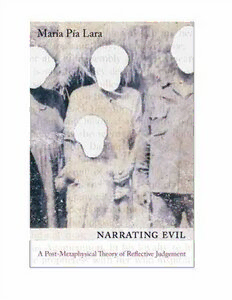Download Narrating Evil: A Postmetaphysical Theory of Reflective Judgment PDF Free - Full Version
Download Narrating Evil: A Postmetaphysical Theory of Reflective Judgment by Maria Pia Lara in PDF format completely FREE. No registration required, no payment needed. Get instant access to this valuable resource on PDFdrive.to!
About Narrating Evil: A Postmetaphysical Theory of Reflective Judgment
Conceptions of evil have changed dramatically over time, and though humans continue to commit acts of cruelty against one another, today we possess a clearer, more moral way of analyzing them. In Narrating Evil, Mar?a P?a Lara explores what has changed in our understanding of evil, why the transformation matters, and how we can learn from this specific historical development.Drawing on Immanuel Kant's and Hannah Arendt's ideas about reflective judgment, Lara argues that narrative plays a key role in helping societies acknowledge their pasts. Particular stories haunt our consciousness and lead to a kind of examination and dialogue that shape notions of morality. A powerful description of a crime can act as a filter, helping us to draw conclusions about what constitutes a moral wrong, and public debates over these narratives allow us to construct a more accurate picture of historical truth, leading to a better understanding of why such actions are possible.In building her argument, Lara considers Greek tragedies, Shakespeare's depictions of evil, Joseph Conrad's literary metaphors, and movies that portray human cruelty. Turning to such philosophers and writers as J?rgen Habermas, Walter Benjamin, Primo Levi, Giorgio Agamben, and Ariel Dorfman, Lara defines a reflexive relationship between an event, the narrative of the event, and the public reception of the narrative, and she proves that the stories of perpetrators and sufferers are always intertwined.The process of disclosure, debate, and the public fashioning of collective judgment are vital methods through which we make sense not only of new forms of cruelty but of past crimes as well. Narrating Evil describes the steps of this process and why they are a crucial part of our attempt to build a different, more just world.
Detailed Information
| Author: | Maria Pia Lara |
|---|---|
| Publication Year: | 2007 |
| ISBN: | 9780231511667 |
| Pages: | 245 |
| Language: | English |
| File Size: | 1.753 |
| Format: | |
| Price: | FREE |
Safe & Secure Download - No registration required
Why Choose PDFdrive for Your Free Narrating Evil: A Postmetaphysical Theory of Reflective Judgment Download?
- 100% Free: No hidden fees or subscriptions required for one book every day.
- No Registration: Immediate access is available without creating accounts for one book every day.
- Safe and Secure: Clean downloads without malware or viruses
- Multiple Formats: PDF, MOBI, Mpub,... optimized for all devices
- Educational Resource: Supporting knowledge sharing and learning
Frequently Asked Questions
Is it really free to download Narrating Evil: A Postmetaphysical Theory of Reflective Judgment PDF?
Yes, on https://PDFdrive.to you can download Narrating Evil: A Postmetaphysical Theory of Reflective Judgment by Maria Pia Lara completely free. We don't require any payment, subscription, or registration to access this PDF file. For 3 books every day.
How can I read Narrating Evil: A Postmetaphysical Theory of Reflective Judgment on my mobile device?
After downloading Narrating Evil: A Postmetaphysical Theory of Reflective Judgment PDF, you can open it with any PDF reader app on your phone or tablet. We recommend using Adobe Acrobat Reader, Apple Books, or Google Play Books for the best reading experience.
Is this the full version of Narrating Evil: A Postmetaphysical Theory of Reflective Judgment?
Yes, this is the complete PDF version of Narrating Evil: A Postmetaphysical Theory of Reflective Judgment by Maria Pia Lara. You will be able to read the entire content as in the printed version without missing any pages.
Is it legal to download Narrating Evil: A Postmetaphysical Theory of Reflective Judgment PDF for free?
https://PDFdrive.to provides links to free educational resources available online. We do not store any files on our servers. Please be aware of copyright laws in your country before downloading.
The materials shared are intended for research, educational, and personal use in accordance with fair use principles.

